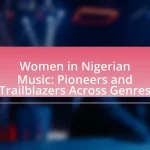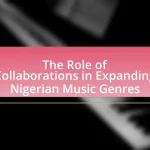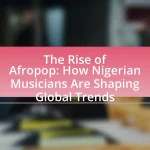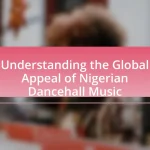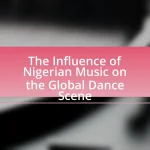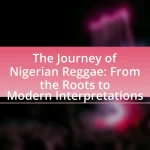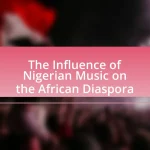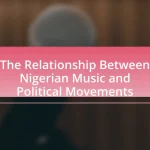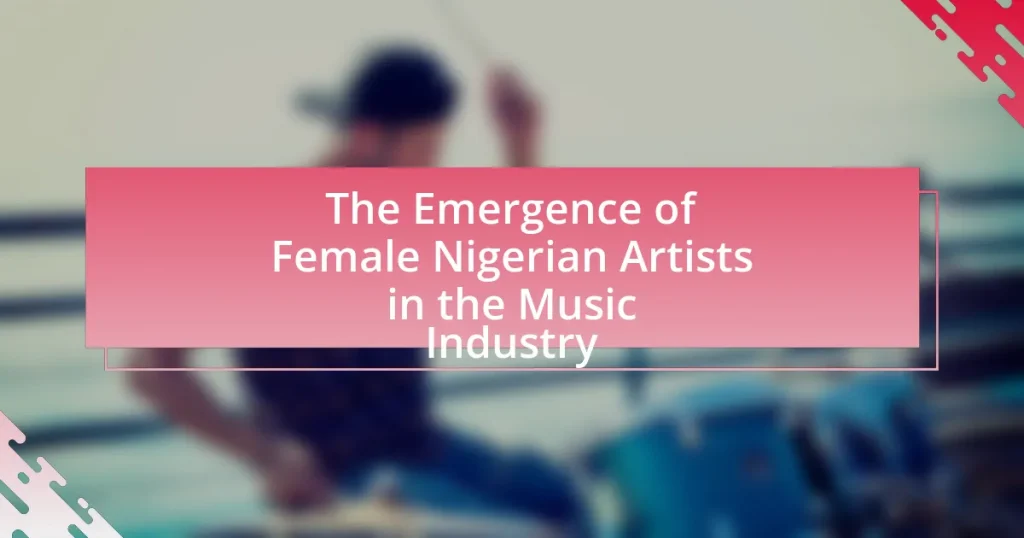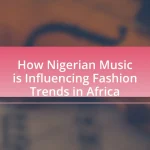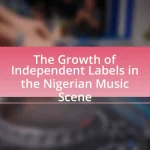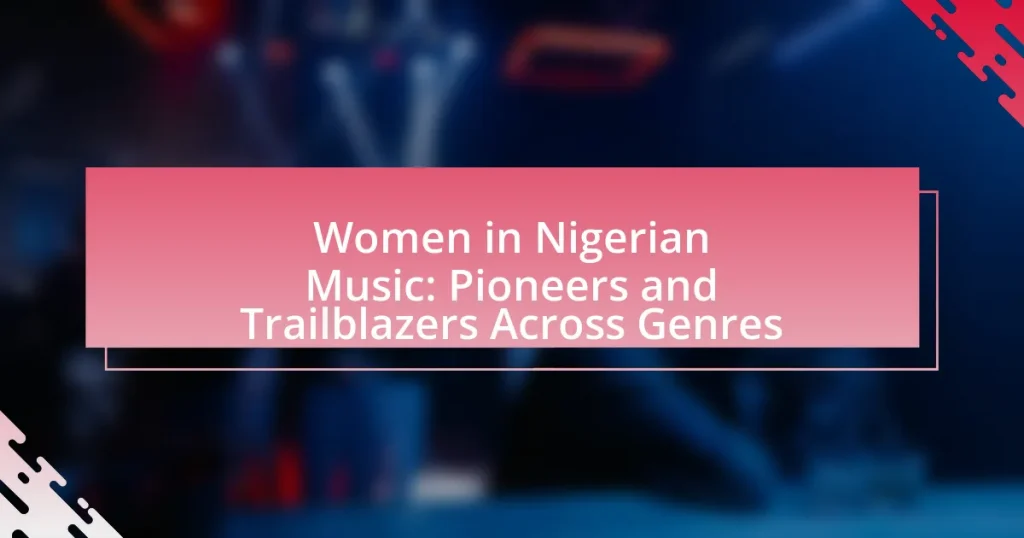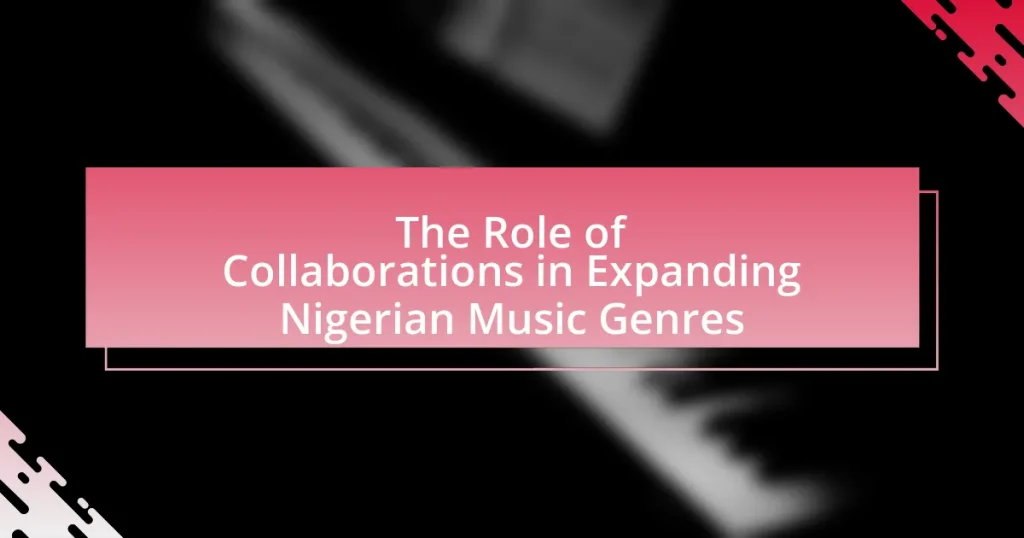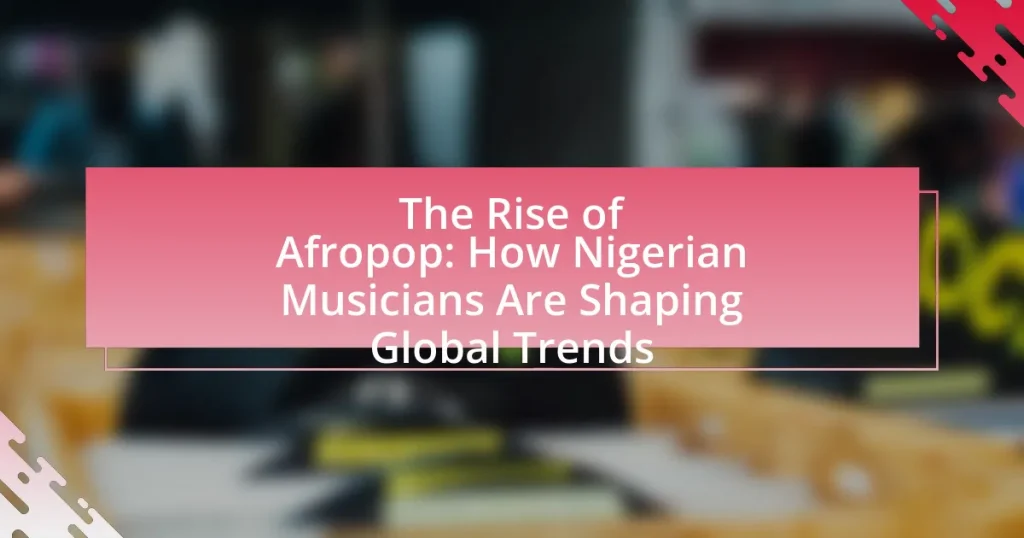The article examines the emergence of female Nigerian artists in the music industry, highlighting key factors such as increased access to education, technology, and changing cultural landscapes. It discusses the traditional roles women have played in Nigerian music, the impact of societal changes on their participation, and the significance of music schools in supporting female artists. Additionally, the article addresses the challenges faced by these artists, including gender inequality, financial obstacles, and harassment, while also showcasing their successes and contributions to social issues. The piece concludes with practical advice for aspiring female musicians on navigating the industry.
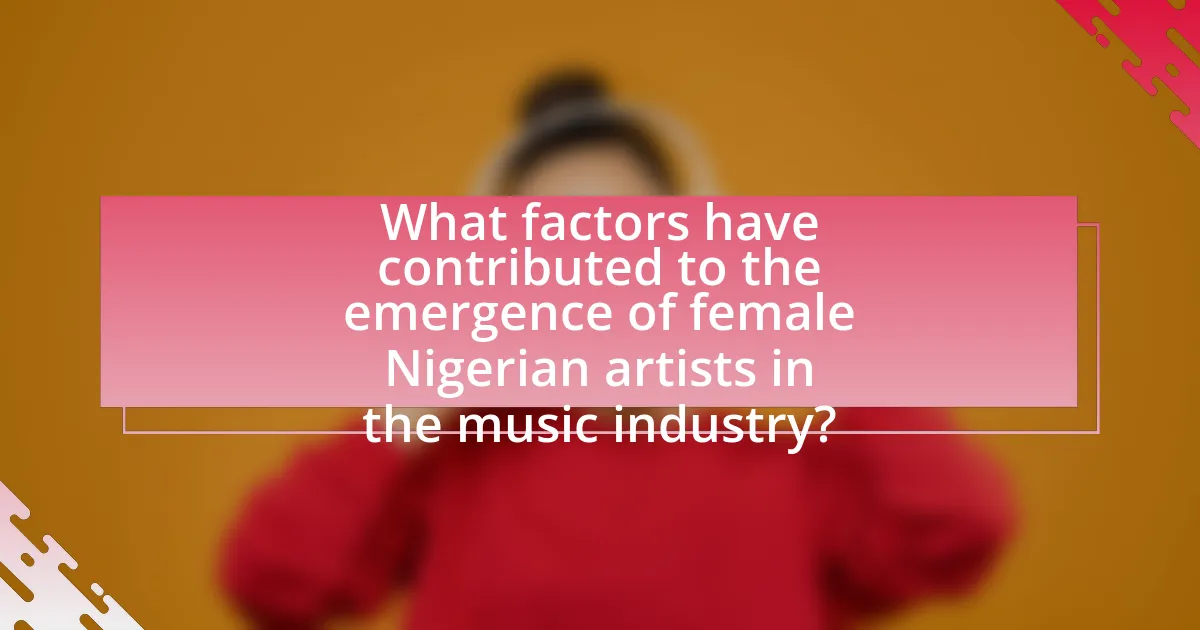
What factors have contributed to the emergence of female Nigerian artists in the music industry?
The emergence of female Nigerian artists in the music industry has been significantly influenced by increased access to education and technology. Educational advancements have empowered women to pursue careers in music, while technology, particularly social media and digital platforms, has provided them with avenues to showcase their talent and reach wider audiences. For instance, platforms like Instagram and YouTube have enabled artists such as Tiwa Savage and Yemi Alade to gain international recognition without traditional gatekeeping. Additionally, the growing acceptance of diverse musical genres, including Afrobeats and hip-hop, has allowed female artists to express their creativity and connect with fans globally.
How has the cultural landscape influenced female artists in Nigeria?
The cultural landscape in Nigeria has significantly influenced female artists by shaping their artistic expression and opportunities within the music industry. Traditional gender roles and cultural expectations often dictate the themes and styles that female artists explore, leading them to incorporate elements of Nigerian heritage, such as indigenous languages and traditional rhythms, into their music. For instance, artists like Tiwa Savage and Yemi Alade blend Afrobeat with contemporary pop, reflecting both cultural pride and modern influences. Additionally, the rise of social media platforms has provided female artists with a space to challenge societal norms and gain visibility, allowing them to reach wider audiences and assert their identities. This shift is evident in the increasing number of female artists who are not only gaining recognition locally but also achieving international acclaim, thereby transforming the cultural narrative surrounding women in Nigerian music.
What traditional roles have women played in Nigerian music?
Women in Nigerian music have traditionally played roles as singers, dancers, and instrumentalists, often serving as custodians of cultural heritage. They have been integral in various genres, including folk, traditional, and contemporary music, where they perform songs that convey social messages, celebrate life events, and preserve oral histories. For instance, in the Yoruba culture, women are known for their participation in ceremonies through music and dance, often leading communal celebrations. Additionally, women have historically been involved in storytelling through music, using their performances to educate and entertain. This involvement is evidenced by the prominence of female figures in traditional music forms, such as the Griot tradition among the Hausa and the praise-singing practices in various ethnic groups, highlighting their essential contributions to the musical landscape of Nigeria.
How have societal changes impacted women’s participation in music?
Societal changes have significantly increased women’s participation in music, particularly in Nigeria, where cultural shifts have challenged traditional gender roles. The rise of feminism and advocacy for gender equality has empowered women to pursue careers in music, leading to a notable increase in female artists in the industry. For instance, the Nigerian music scene has seen a surge of successful female musicians such as Tiwa Savage and Yemi Alade, who have gained international recognition. Additionally, the proliferation of social media platforms has provided women with greater visibility and opportunities to showcase their talents, further enhancing their presence in the music industry.
What role does education play in the rise of female musicians?
Education plays a crucial role in the rise of female musicians by providing them with the necessary skills, knowledge, and confidence to succeed in the music industry. Access to formal music education, such as training in vocal techniques, music theory, and performance, equips female artists with the tools to enhance their artistry and professionalism. For instance, institutions like the Muson School of Music in Nigeria have produced numerous successful female musicians who have gained recognition both locally and internationally. Furthermore, education fosters networking opportunities and mentorship, which are vital for career advancement in a competitive field. Studies indicate that educated female musicians are more likely to navigate the industry effectively, leading to increased visibility and success.
How have music schools and programs supported female artists?
Music schools and programs have supported female artists by providing access to education, mentorship, and performance opportunities tailored to their needs. These institutions often implement initiatives specifically aimed at empowering women, such as scholarships for female students, workshops led by successful female musicians, and networking events that connect aspiring female artists with industry professionals. For instance, programs like the Women in Music initiative have been instrumental in fostering a supportive community and enhancing visibility for female talent in Nigeria’s music scene. Additionally, research indicates that female representation in music education has increased, leading to a rise in female artists who are now more equipped to navigate the industry successfully.
What impact does access to technology have on female musicians?
Access to technology significantly empowers female musicians by providing them with tools for creation, distribution, and promotion of their music. This access enables them to produce high-quality recordings from home studios, utilize social media platforms for marketing, and reach global audiences without the need for traditional record labels. For instance, a study by the International Federation of the Phonographic Industry (IFPI) in 2021 highlighted that digital platforms have increased the visibility of female artists, allowing them to gain recognition and build fan bases independently. Furthermore, technology facilitates collaboration with other artists and producers, enhancing their creative output and networking opportunities.
How has the global music scene affected female Nigerian artists?
The global music scene has significantly empowered female Nigerian artists by providing them with broader platforms for exposure and collaboration. This increased visibility has led to a surge in international collaborations, allowing artists like Tiwa Savage and Yemi Alade to reach global audiences and gain recognition beyond Nigeria. According to a 2021 report by the International Federation of the Phonographic Industry, African music, including Nigerian female artists, saw a 20% increase in streaming globally, highlighting the growing interest in their work. This trend has not only enhanced their commercial success but also inspired a new generation of female musicians in Nigeria to pursue careers in music, contributing to a more diverse and dynamic industry.
What opportunities have arisen from international collaborations?
International collaborations have created significant opportunities for female Nigerian artists in the music industry, including increased exposure to global audiences and access to diverse musical influences. These collaborations often lead to joint projects with international artists, enhancing the visibility of Nigerian talent on platforms such as streaming services and social media. For instance, partnerships with well-known global musicians can result in cross-genre fusions that attract a wider fan base, exemplified by artists like Tiwa Savage and Yemi Alade, who have successfully collaborated with international stars. Such collaborations not only elevate their profiles but also contribute to the growth of the Nigerian music scene on a global scale, fostering cultural exchange and innovation.
How do female Nigerian artists navigate global music trends?
Female Nigerian artists navigate global music trends by blending traditional African sounds with contemporary genres such as Afrobeats, hip-hop, and R&B. This fusion allows them to appeal to both local and international audiences, enhancing their visibility on global platforms. For instance, artists like Tiwa Savage and Yemi Alade have successfully collaborated with international stars, which has expanded their reach and influence. Additionally, the rise of digital streaming platforms has enabled these artists to distribute their music worldwide, further integrating them into the global music scene. The increasing recognition of Afrobeats as a dominant genre in the global market, evidenced by its chart performance and international collaborations, underscores the effectiveness of their navigation strategies.
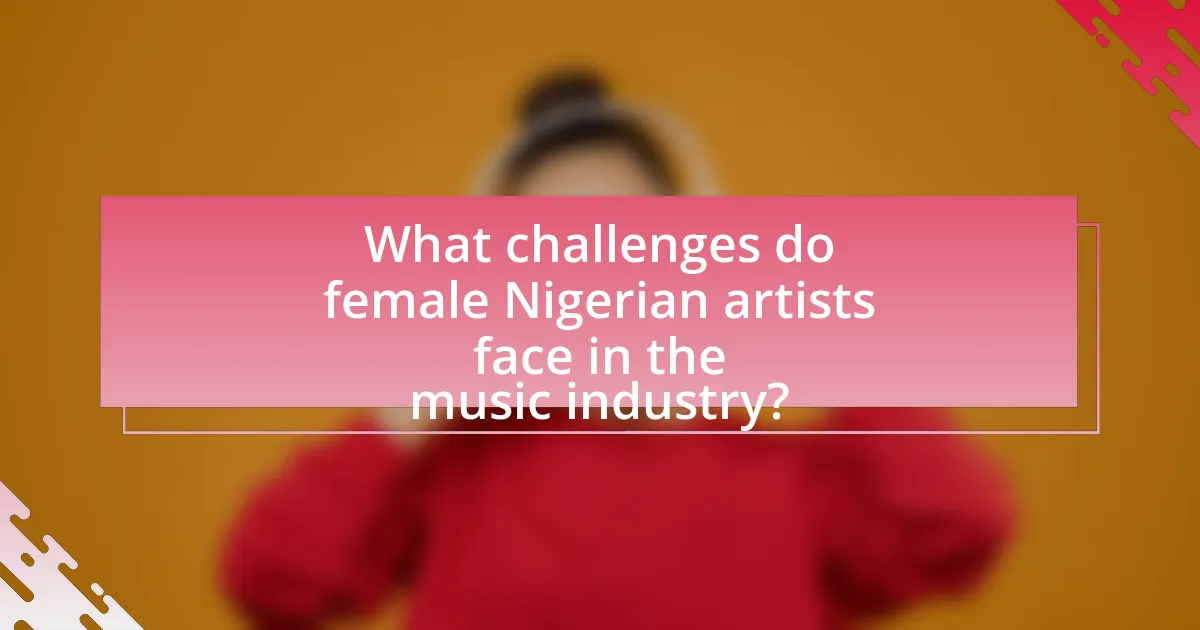
What challenges do female Nigerian artists face in the music industry?
Female Nigerian artists face significant challenges in the music industry, including gender discrimination, limited access to funding, and societal expectations. Gender discrimination manifests in the form of unequal opportunities compared to male counterparts, often resulting in fewer performances and promotional support. Limited access to funding restricts their ability to produce high-quality music and market themselves effectively, as many female artists struggle to secure financial backing from record labels or investors. Societal expectations further complicate their careers, as traditional norms often prioritize domestic roles for women, leading to a lack of support from families and communities. These challenges hinder the growth and visibility of female talent in Nigeria’s vibrant music scene.
How does gender inequality manifest in the Nigerian music scene?
Gender inequality in the Nigerian music scene manifests through limited opportunities for female artists, pervasive stereotypes, and unequal representation in media. Female musicians often face challenges such as fewer performance opportunities and lower visibility compared to their male counterparts, which is evident in the underrepresentation of women in major music festivals and award nominations. For instance, a study by the International Federation of the Phonographic Industry (IFPI) in 2021 highlighted that only 20% of artists in the Nigerian music industry are women, reflecting systemic barriers that hinder their advancement. Additionally, societal expectations often confine female artists to specific genres or roles, reinforcing traditional gender norms and limiting their creative expression.
What barriers do female artists encounter in gaining recognition?
Female artists encounter significant barriers in gaining recognition, including gender bias, limited access to resources, and societal expectations. Gender bias manifests in the music industry through unequal opportunities for promotion and representation, often favoring male artists. Limited access to resources, such as funding and industry networks, restricts female artists’ ability to produce and market their work effectively. Societal expectations often pressure female artists to conform to traditional roles, which can hinder their creative expression and visibility. Research by the International Federation of the Phonographic Industry indicates that women represent only 20% of artists in the global music industry, highlighting the systemic challenges they face in achieving recognition.
How do stereotypes affect the careers of female musicians?
Stereotypes significantly hinder the careers of female musicians by perpetuating biases that limit their opportunities and recognition. Female musicians often face societal expectations that prioritize their appearance over their talent, leading to a lack of serious consideration for their artistic contributions. For instance, a study by the University of Southern California found that women in the music industry are often underrepresented in key roles, with only 22% of artists in the Billboard Hot 100 being female in 2020. This underrepresentation is compounded by stereotypes that suggest women should conform to traditional gender roles, which can restrict their creative expression and career advancement. Additionally, female musicians frequently encounter challenges such as being typecast into specific genres or being judged more harshly than their male counterparts, which further stifles their professional growth and visibility in the industry.
What financial obstacles do female artists face?
Female artists face significant financial obstacles, including limited access to funding and investment opportunities. Research indicates that women in the music industry often encounter barriers such as gender bias in funding decisions, which can result in fewer grants and sponsorships compared to their male counterparts. For instance, a study by the Annenberg Inclusion Initiative found that only 12.3% of women received funding for their projects, highlighting the disparity in financial support. Additionally, female artists frequently experience lower pay rates for performances and less representation in high-paying roles within the industry, further exacerbating their financial challenges.
How does funding disparity impact female musicians compared to their male counterparts?
Funding disparity significantly hinders female musicians compared to their male counterparts by limiting their access to resources necessary for career development. Female musicians often receive less financial support from record labels, which can result in fewer opportunities for marketing, production, and touring. For instance, a study by the Annenberg Inclusion Initiative found that only 21% of artists in popular music are women, highlighting the systemic barriers they face in securing funding. This lack of investment restricts their visibility and growth in the industry, perpetuating gender inequality in music.
What strategies do female artists use to overcome financial challenges?
Female artists in Nigeria employ various strategies to overcome financial challenges, including diversifying income streams, leveraging social media for marketing, and collaborating with other artists. By diversifying income streams, such as engaging in live performances, merchandise sales, and brand partnerships, female artists can create multiple revenue sources. Social media platforms like Instagram and TikTok enable them to reach wider audiences and promote their work effectively, often at a lower cost than traditional marketing methods. Collaborations with other artists not only enhance their visibility but also allow for shared resources and costs, making it easier to navigate financial constraints. These strategies are essential for sustaining their careers in a competitive industry.
How do personal safety and harassment issues affect female artists?
Personal safety and harassment issues significantly impact female artists by limiting their opportunities and affecting their mental health. Female artists often face threats of violence and sexual harassment, which can lead to increased anxiety and stress, ultimately hindering their creative expression and professional growth. For instance, a study by the International Federation of Musicians found that 70% of female musicians reported experiencing harassment in their careers, which can discourage them from pursuing opportunities in a male-dominated industry. This pervasive environment not only affects their personal safety but also contributes to a culture of silence, where many female artists feel compelled to remain quiet about their experiences, further perpetuating the cycle of harassment and limiting their visibility and success in the music industry.
What measures are being taken to ensure the safety of female musicians?
Measures being taken to ensure the safety of female musicians include the implementation of stricter security protocols at events and the establishment of support networks within the industry. For instance, event organizers are increasingly hiring professional security teams to protect female artists during performances, addressing concerns about harassment and violence. Additionally, organizations such as the Women in Music initiative provide resources and advocacy for female musicians, promoting safe working environments and offering legal support in cases of abuse. These measures are crucial in fostering a safer atmosphere for female artists in the Nigerian music industry.
How do female artists cope with harassment in the industry?
Female artists cope with harassment in the industry by establishing support networks, utilizing social media for awareness, and advocating for policy changes. These strategies allow them to share experiences, seek solidarity, and raise public consciousness about the issue. For instance, many female artists in Nigeria have formed collectives that provide emotional and professional support, enabling them to navigate challenges collectively. Additionally, social media platforms serve as powerful tools for these artists to highlight incidents of harassment, garnering public support and prompting discussions that can lead to systemic changes in the industry. Research indicates that collective action and visibility can significantly reduce instances of harassment, as seen in various movements advocating for women’s rights globally.
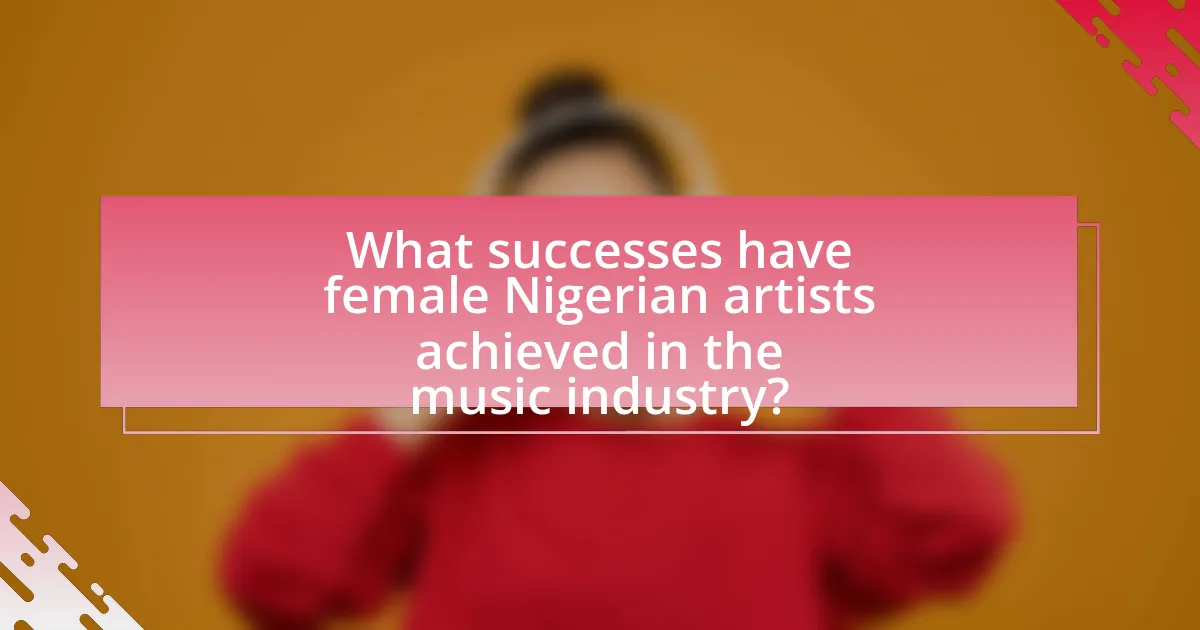
What successes have female Nigerian artists achieved in the music industry?
Female Nigerian artists have achieved significant successes in the music industry, including international recognition, chart-topping hits, and influential awards. Notably, artists like Tiwa Savage and Yemi Alade have gained global acclaim, with Tiwa Savage being the first female Nigerian artist to win the MTV Africa Music Award for Best Female in 2014. Additionally, Yemi Alade’s song “Johnny” became a viral hit, amassing over 100 million views on YouTube, showcasing the commercial viability of female artists in Nigeria. Furthermore, Burna Boy’s Grammy win in 2021 highlighted the growing influence of Nigerian music, paving the way for female artists to gain similar recognition on international platforms. These achievements underscore the transformative impact of female Nigerian artists in shaping the music landscape both locally and globally.
How have female artists influenced the Nigerian music genre?
Female artists have significantly influenced the Nigerian music genre by introducing diverse sounds and themes that resonate with broader audiences. Pioneers like Onyeka Onwenu and Asa have blended traditional African music with contemporary genres, expanding the musical landscape. Additionally, artists such as Tiwa Savage and Yemi Alade have brought global attention to Nigerian music through their unique styles and international collaborations, contributing to the rise of Afrobeats on the world stage. Their lyrical content often addresses social issues, empowerment, and cultural identity, further enriching the genre and inspiring a new generation of musicians.
What unique styles and sounds have emerged from female musicians?
Unique styles and sounds that have emerged from female Nigerian musicians include Afrobeats, highlife, and traditional folk music, often infused with contemporary elements. Artists like Tiwa Savage and Yemi Alade have popularized Afrobeats, blending traditional African rhythms with pop and R&B influences, which has led to a global recognition of this genre. Additionally, artists such as Simi and Asa incorporate elements of soul and jazz into their music, creating a unique sound that resonates with diverse audiences. The rise of female musicians in Nigeria has also seen the integration of local dialects and storytelling into their lyrics, reflecting cultural narratives and personal experiences, thereby enriching the music landscape.
How have female artists contributed to the global perception of Nigerian music?
Female artists have significantly enhanced the global perception of Nigerian music by introducing diverse sounds and narratives that resonate internationally. Artists like Tiwa Savage and Yemi Alade have gained global recognition, with Tiwa Savage’s collaborations with international stars such as Beyoncé and her performances at major festivals showcasing the richness of Afrobeats. Additionally, Yemi Alade’s hit “Johnny” has amassed over 100 million views on YouTube, illustrating the widespread appeal of Nigerian music. These artists not only elevate the genre but also challenge stereotypes, presenting a modern and multifaceted image of Nigeria to the world. Their influence has led to increased interest in Nigerian music, contributing to its global popularity and acceptance.
What notable achievements have female Nigerian artists accomplished?
Female Nigerian artists have achieved significant milestones, including winning prestigious awards and breaking into international markets. Notably, artists like Tiwa Savage and Yemi Alade have garnered multiple awards, such as the MTV Africa Music Awards and the International Songwriting Competition, showcasing their global appeal and talent. Additionally, Burna Boy’s collaboration with female artists like Tems on the Grammy-winning album “Twice as Tall” highlights the increasing recognition of female contributions in the industry. Furthermore, female artists have also made strides in streaming platforms, with artists like Simi and Niniola achieving millions of streams on platforms like Spotify and Apple Music, reflecting their growing influence and popularity.
Which awards and recognitions have female artists received?
Female artists in the Nigerian music industry have received numerous awards and recognitions, including the Headies Awards, which honor outstanding achievements in Nigerian music. Notable winners include Tiwa Savage, who has won multiple Headies, and Yemi Alade, recognized for her contributions with awards such as the MTV Africa Music Awards. Additionally, female artists have been acknowledged at international platforms like the Grammy Awards, with Burna Boy’s collaboration featuring female artists gaining nominations. These accolades highlight the significant impact and recognition of female talent in the evolving Nigerian music scene.
How have successful female artists paved the way for newcomers?
Successful female artists have paved the way for newcomers by breaking barriers and establishing a platform for female representation in the Nigerian music industry. For instance, artists like Asa and Tiwa Savage have not only achieved commercial success but have also challenged gender norms, inspiring a new generation of female musicians. Their visibility and influence have led to increased opportunities for emerging artists, as seen in the rise of talents like Tems and Ayra Starr, who cite these established figures as inspirations. Furthermore, initiatives such as mentorship programs and collaborations initiated by successful female artists have directly supported newcomers, fostering a more inclusive environment in the industry.
What impact do female artists have on social issues in Nigeria?
Female artists in Nigeria significantly influence social issues by using their platforms to address topics such as gender equality, domestic violence, and political corruption. For instance, artists like Tiwa Savage and Simi have openly discussed the challenges women face in society, promoting awareness and encouraging dialogue. Their music often reflects societal struggles, resonating with audiences and inspiring activism. Additionally, female artists participate in campaigns and initiatives that advocate for women’s rights, further amplifying their impact on social change. This engagement not only raises awareness but also mobilizes support for various causes, demonstrating the powerful role of female artists in shaping social discourse in Nigeria.
How do female musicians use their platform to advocate for change?
Female musicians advocate for change by leveraging their visibility and influence to address social issues, promote gender equality, and inspire empowerment within their communities. For instance, Nigerian artists like Tiwa Savage and Yemi Alade use their music and public appearances to highlight issues such as domestic violence and women’s rights, often incorporating these themes into their lyrics and public statements. Additionally, they participate in campaigns and collaborations that focus on social justice, such as Tiwa Savage’s involvement in the #EndSARS movement, which protested against police brutality in Nigeria. This active engagement not only raises awareness but also mobilizes their fan base to take action, demonstrating the significant impact female musicians can have in advocating for societal change.
What role do female artists play in promoting women’s rights in Nigeria?
Female artists in Nigeria play a crucial role in promoting women’s rights by using their music and platforms to address social issues, advocate for gender equality, and empower women. Through their lyrics and public personas, these artists challenge societal norms, raise awareness about women’s rights, and inspire change. For instance, artists like Tiwa Savage and Simi have addressed issues such as domestic violence and gender discrimination in their songs, effectively reaching a wide audience and sparking conversations around these topics. Their influence extends beyond music, as they engage in activism and collaborate with organizations focused on women’s rights, thereby amplifying their impact in the fight for gender equality in Nigeria.
What practical advice can aspiring female Nigerian artists follow to succeed in the music industry?
Aspiring female Nigerian artists can succeed in the music industry by building a strong personal brand and leveraging social media for promotion. Establishing a unique identity helps differentiate them in a competitive market, while platforms like Instagram and TikTok allow for direct engagement with fans and wider reach. According to a 2021 report by the International Federation of the Phonographic Industry, social media is a crucial tool for artists, with 70% of music consumers discovering new music through these channels. Additionally, networking with industry professionals and collaborating with other artists can open doors to opportunities and increase visibility.
